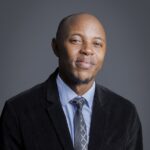Atlantic Fellows for Health Equity brings together health professionals from around the world and across disciplines to build leaders, combat disparities and create community. Its mission is to develop global leaders who not only understand the roots of health inequities but also have the skills and courage to create more equitable organizations and communities.
Each year, fellows share their reflections through Equity Talks — short presentations that highlight their leadership journey and learning during the fellowship. We are proud to bring some of these insights to the BMJ Leader Blog audience.
The blog below was written by Odur Anthony, a 2024 Atlantic Fellow for Health Equity.
To watch the recording of this talk, click here
Two years define the trajectory of my life: 1994 and 2018. In 1994, I lost my mother. In 2018, I lost my father. Each was a loss traceable to a healthcare system that prioritizes profit over people.
My country experienced a major economic shift in 1987, instigated by World Bank and International Monetary Fund policies. The current government embarked on a policy of privatization, withdrawing from essential sectors such as education and health. Public services that had been a lifeline for our people were suddenly left to market forces – available only to those who could afford them.
In 1994, my mother was pregnant and due to deliver. I was nine years old and was assured by her that she would come back home with “visitors”—a reference that I did not have the understanding to make complete sense of at such a young age. She left for the hospital in a private car, as there was no ambulance was available.
Hours later, my uncle returned home in tears. My mother had passed away. She had suffered from obstructed labor and needed a blood transfusion, but my family lacked financial means to secure the care she needed. She died because we couldn’t afford a system that had turned healthcare into a privilege rather than a right.
Fast forward to 2018. My father was terminally ill and living with HIV. During my bar course, I received a call requiring me to report to his sick bed and attend to him. Public hospitals were struggling—understaffed, under-resourced and overwhelmed. Yet, private healthcare was not an option for us.
I was the only one of his 20 children by his bedside. He fought for his life, struggling to breathe as oxygen supplies ran low. I moved from one hospital ward to another in search of an oxygen cylinder and eventually persuaded one patient to lend us theirs for just two hours. My father stabilized, but only briefly. As I tried to feed him, he took his last breath.
I lost my father the same way I lost my mother—because access to quality healthcare in my country depends on one’s ability to pay. Far too many, like my parents, are left behind.
The COVID-19 pandemic only amplified the intrinsic weaknesses in our healthcare. Private hospitals took advantage of the crisis, charging exorbitant fees, while public hospitals remained insufficiently equipped to handle the influx of patients. Those who could not afford treatment suffered the most, reinforcing the urgent need for government intervention.
We could not stand by any longer. My colleagues and I took legal action, calling for government to regulate private healthcare providers. Our case was simple: healthcare should not be dictated by profit margins. We argued that government’s responsibility to set fair medical rates and end the practice of detaining patients who could not pay their bills.
In January, while I was in Washington, D.C., for my cohort’s Initial Convening, we got a major legal victory. The court ruled in our favor, upholding that the government is mandated to regulate private healthcare providers. But the fight wasn’t over. The Attorney General appealed the decision, threatening to undo our progress.
At this crossroads, the Atlantic Fellows for Health Equity program provided me with the tools to navigate the next phase of this struggle. As a practicing attorney, I had limited my strategies to legal battles in the courtroom. However, through the fellowship, I learned that advocacy is broader litigation—it’s about storytelling, coalition-building and engaging stakeholders with a shared vision.
I began working more closely with community members, amplifying their voices and experiences. By centering real stories—like that of a detained mother unable to pay her medical bills—we sparked deeper conversations about the need for health insurance and broader systemic reforms.
Our fight is far from over. The court battle continues, but so does our movement. Every mother, father, and child denied healthcare due to financial barriers reminds us of the urgency of our cause. Our legal victory was just the beginning; our mission is to ensure that no family has to suffer the same losses that mine did.
Healthcare is not a privilege—it is a fundamental human right. We will not stop fighting until that right is realized for all.
Author

Odur co-founded the Health Equity and Policy Initiative (HEAPI), a not-for-profit entity championing the right to health for the most vulnerable individuals in Uganda. He is a Senior Atlantic Fellow for Health Equity.
Declaration of interests
I have read and understood the BMJ Group policy on declaration of interests and declare the following interests: none.